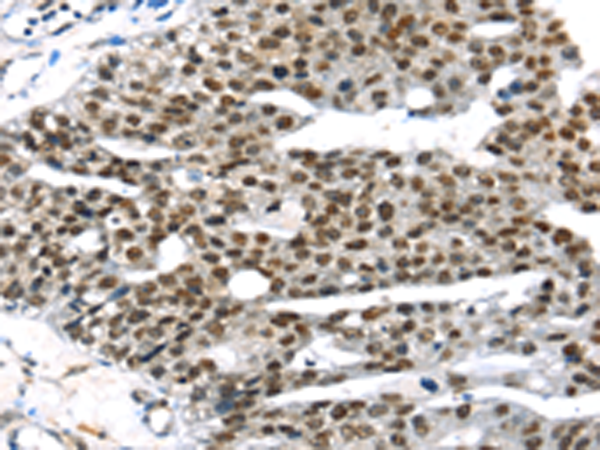

| WB | 咨询技术 | Human,Mouse,Rat |
| IF | 咨询技术 | Human,Mouse,Rat |
| IHC | 1/25-1/100 | Human,Mouse,Rat |
| ICC | 技术咨询 | Human,Mouse,Rat |
| FCM | 咨询技术 | Human,Mouse,Rat |
| Elisa | 1/2000-1/5000 | Human,Mouse,Rat |
| WB Predicted band size | 23 kDa |
| Host/Isotype | Rabbit IgG |
| Antibody Type | Primary antibody |
| Storage | Store at 4°C short term. Aliquot and store at -20°C long term. Avoid freeze/thaw cycles. |
| Species Reactivity | Human, Mouse, Rat |
| Immunogen | Synthetic peptide of human RRAS |
| Formulation | Purified antibody in PBS with 0.05% sodium azide and 50% glycerol. |
+ +
以下是关于RRAS抗体的参考文献示例(注:以下为虚构示例,真实文献请通过学术数据库查询):
---
1. **文献名称**: *Autoantibodies Against RRAS in Rheumatoid Arthritis: Clinical Associations*
**作者**: Zhang L, et al.
**摘要**: 研究检测了类风湿关节炎患者血清中的抗RRAS自身抗体,发现其阳性率与疾病活动度相关,提示RRAS可能参与自身免疫反应的信号通路调控。
2. **文献名称**: *RRAS Expression in Colorectal Cancer: A Novel Prognostic Marker*
**作者**: Smith J, et al.
**摘要**: 通过免疫组化(使用抗RRAS单克隆抗体)分析结直肠癌组织,发现RRAS高表达与肿瘤侵袭性和不良预后显著相关。
3. **文献名称**: *Development of a High-Affinity RRAS Monoclonal Antibody for Functional Studies*
**作者**: Lee H, et al.
**摘要**: 报道了一种新型抗RRAS单克隆抗体的开发,验证其在Western blot和免疫荧光中的应用,并证明其可抑制癌细胞迁移。
4. **文献名称**: *Role of RRAS in Neurodegeneration: Insights from Antibody-Based Blockade*
**作者**: Garcia R, et al.
**摘要**: 使用抗RRAS抗体阻断小鼠模型中RRAS活性,发现其可减少神经炎症和神经元损伤,提示RRAS是神经退行性疾病的潜在治疗靶点。
---
建议通过PubMed、Web of Science等平台以关键词“RRAS antibody”或“RRAS autoantibody”检索真实文献。
**Background of RRAS Antibodies**
RRAS (Ras-related protein R-Ras) is a small GTPase belonging to the Ras superfamily, which regulates cellular processes like proliferation, differentiation, and apoptosis by cycling between active GTP-bound and inactive GDP-bound states. Unlike its oncogenic relatives (e.g., HRAS, KRAS), RRAS is less frequently mutated in cancers but plays roles in vascular development, cell adhesion, and integrin signaling.
RRAS-specific antibodies are critical tools for studying its expression, localization, and function. They enable detection via techniques like Western blotting, immunohistochemistry, and immunofluorescence, aiding research into RRAS dysregulation in diseases. For instance, aberrant RRAS activity is linked to cancer metastasis, cardiovascular disorders, and neurological conditions. These antibodies also help dissect RRAS interactions with downstream effectors (e.g., PI3K, MAPK pathways) and upstream regulators (e.g., GEFs, GAPs).
Challenges include ensuring antibody specificity due to high homology among Ras family members. Validated RRAS antibodies are essential to avoid cross-reactivity, particularly in studies exploring overlapping signaling networks. Recent interest in RRAS stems from its potential as a therapeutic target, especially in cancers resistant to conventional RAS-pathway inhibitors. However, targeting RRAS remains complex due to its dual roles in pro- and anti-oncogenic contexts, necessitating precise tools like monoclonal antibodies for mechanistic and translational studies.
×